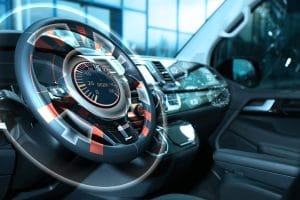 With Tesla leading the charge, there are more autonomous or semi-autonomous vehicles on the road than ever before. It stands to reason that the number of crashes involving these vehicles will increase as more of them hit the roads and encounter the realities of navigating complex traffic systems. All new technology faces challenges during development, but the cost of a mistake with autonomous vehicles on public roadways remains unacceptably high – when this technology fails, people can die.
With Tesla leading the charge, there are more autonomous or semi-autonomous vehicles on the road than ever before. It stands to reason that the number of crashes involving these vehicles will increase as more of them hit the roads and encounter the realities of navigating complex traffic systems. All new technology faces challenges during development, but the cost of a mistake with autonomous vehicles on public roadways remains unacceptably high – when this technology fails, people can die.
A recent article in FreightWaves reported that the National Highway Traffic Safety Administration (NHTSA) offered a shocking estimate while seeking a budget approval from the Office of Management and Budget (OMB). The NHTSA projected (from existing data) that the number of autonomous vehicle crashes next year will nearly double – and carry a hefty price tag. The agency expects that the total cost of reporting these incidents will be somewhere in the area of $1.17 million of taxpayer money.
Why such a large increase? Generally speaking, data follows trends. Minor statistical deviations are to be expected, especially when large numbers are involved. For instance, according to the Tennessee Highway Safety Office (THSO), there were 1094 fatalities on our state highways as of late October 2021. On the same day in 2020, there 978 deaths on Tennessee highways. Statistically speaking, that’s a four percent increase over the course of a single year. A 100% increase is nearly unthinkable.
However, the increase is projected for “automated” driving crashes, and there are some unique circumstances that need to be taken into consideration. For instance, FreightWaves notes there were a scant 105 automated driving system (ADS) crashes reported to California in 2019. This isn’t because these vehicles are inherently safer. Instead, the low number is attributable to the fact that so few true ADS vehicles are on the road – and that phrase “automated driving system” isn’t very clear.
Why do automakers test in California?
Let’s take these one at a time. The NHTSA projections used crash data from California in particular. The reason for this is simple; truly autonomous vehicles are extremely technologically advanced. California is home to the legendary Silicon Valley, a region internationally renowned for high technology and innovation.
Additionally, California passed legislation in 2018 that allowed the state’s Department of Motor Vehicles to issue autonomous vehicle testing permits. This legislative act was one of the first of its kind, and resulted in automakers opening satellite facilities to take advantage of the opportunities it afforded.
Though the technology shows a great deal of promise for a safer tomorrow, fully autonomous vehicles aren’t here quite yet. The very terms used to describe available technologies in their current forms (like automated or autonomous) are often used interchangeably, and can cause a great deal of confusion. It’s a simple matter of vocabulary, but in this case the differences are critical. Airbus succinctly defines these two terms as follows:
- Automation refers to the ability of a system to control a vehicle, like autopilot or cruise control.
- Autonomy is the ability of a system to not only control a vehicle but respond to unexpected hazards.
While this helps to distinguish between types of technology, it doesn’t help to define the distinctions between the different types of technologies on the market and in development. Tesla’s Autopilot feature is easily the most well-known ADS on the market, but it still requires manual “co-piloting”. For a comprehensive understanding of ADS technology, we turn to this article from JD Power:
If a vehicle has Level 0, Level 1, or Level 2 driver support systems, an active and engaged driver is required. She is always responsible for the vehicle’s operation, must supervise the technology at all times, and must take complete control of the vehicle when necessary.
In the future, if a vehicle has Level 3, Level 4, or Level 5 automated driving systems, the technology takes complete control of the driving without human supervision. However, with Level 3, if the vehicle alerts the driver and requests she takes control of the vehicle, she must be prepared and able to do so.
It is worth repeating and emphasizing the following: As of May 2021, no vehicles sold in the U.S. market have a Level 3, Level 4, or Level 5 automated driving system. All of them require an alert driver sitting in the driver’s seat, ready to take control at any time. If you believe otherwise, you are mistaken, and it could cost you your life, the life of someone you love, or the life of an innocent bystander.
At the risk of being repetitive, it’s worth noting that “As of May 2021, no vehicles sold in the U.S. market have a Level 3, Level 4, or Level 5 automated driving system.” Every single ADS available to the public should be referred to as an “assistive driving system” and not an “automated driving system.” This lack of clarity can and does have very real consequences.
First and foremost, even though these features aren’t inherently dangerous, drivers can come to trust and overly rely on emerging technologies. When a very human moment of inattention is coupled with a product marketed as “automatic,” the consequences can be and often are deadly. Tesla isn’t the only one marketing assistive driving technology, but the company is taking its share of lumps for being the first to market (see tesladeaths.com for more).
The most recent victim of an ADS mishap was 52-year-old Jean Louis. From CBS, “The accident [happened] just after midnight Monday. According to officers, Jean Louis stopped his car on the left shoulder of the westbound LIE [Long Island Expressway] near the College Point Boulevard exit [to fix a flat tire]. That is where the NYPD says a driver behind the wheel of a Tesla hit him.” Accident reports confirmed the vehicle was in Autopilot mode at the time.
With testing of emerging technologies on the rise and on the roads, the risk of catastrophic or fatal injuries is higher than ever.
If you or a loved one has been the victim of a crash resulting in debilitating injuries, the experienced Sevierville personal injury and wrongful death attorneys at Delius & McKenzie, PLLC know what to do. To schedule a no-obligation consultation with one of our attorneys, call our offices at 865-428-8780 or fill our contact form to schedule a confidential appointment at your convenience. We also serve clients in Sevierville, Seymour, Gatlinburg and Pigeon Forge.

Attorney Bryan E. Delius was born and raised in Sevier County, TN. He founded Delius & McKenzie more than 20 years ago, after receiving his JD from the University of Tennessee at Knoxville. He is admitted in Tennessee and in several federal court systems. Learn more about Bryan E. Delius.




